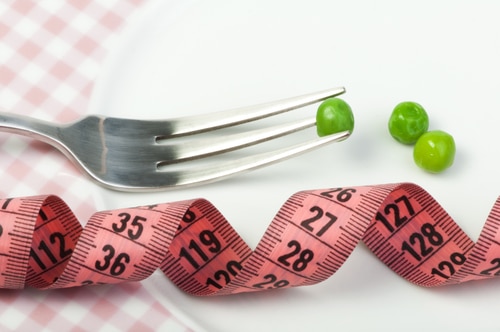
The Problem with Overly Aggressive Calorie Restriction
When you’re trying to lose body fat, you still have to provide your body with adequate calories and nutrition. There’s no room here for empty calories. Every calorie counts. Your body still needs enough energy and macronutrients to meet your basic energy requirements and fuel your workouts.
What happens when you don’t supply your body’s energy needs? When you restrict calories over a period of weeks, it makes adjustments to maintain homeostasis. Your body is constantly making these kinds of adjustments. For example, when your internal temperature drops, your body senses this and you shiver to generate more heat to bring your temperature back into the normal range. Similar adaptations take place when you don’t eat enough calories to supply your energy needs, only this time it’s your thyroid gland that “adapts.”
Research shows that even a moderate reduction in calories over as little as a few days reduces thyroid function. In particular, the active form of thyroid hormone, T3, decreases. When this happens, you have to deal with a slower metabolism, making it harder to shed body fat. Your body does all this in an attempt to maintain energy balance.
Other Metabolic Changes That Occur When You Restrict Calories Too Much
Another hormone impacted by calorie restriction is leptin. Leptin is a hormone produced by fat cells that tells your brain how much energy you have on hand. When you’re in a fed state, leptin levels increase while they drop dramatically when you’re in an energy-deprived state. Why is this bad? When leptin levels drop, your metabolic rate slows down and you become hungrier. That’s when the cravings start and you begin reaching for the wrong foods.
Is there a way to avoid this? There is some anecdotal evidence that restricting calories for a few days followed by a “refeeding” day where you increase your calorie intake increases leptin levels and jumpstarts your metabolism. This is the whole basis behind calorie cycling and carb cycling that has become popular among bodybuilders. What we do know is that chronic calorie restriction reduces leptin and T3, thereby slowing down your metabolism in an attempt to maintain energy balance and that short periods of refeeding helps to boost leptin levels.
Another hormone that rises when you don’t eat enough calories is cortisol. This catabolic hormone, produced by your adrenal glands, increases as your energy reserves fall and from the stress of calorie restriction. Cortisol sends a signal to your liver to convert amino acids into glucose to provide the energy your body needs during periods of calorie restriction through a process called gluconeogenesis. Guess where those amino acids come from? From your muscle.
Cortisol increases muscle breakdown and contributes to loss of bone mass too. These are tissues you want to maintain. Cortisol also has an immune-suppressive effect, putting you at greater risk for infection. In addition, chronically high levels cause a change in fat distribution so that you store more fat around your waist and tummy.
Effects of Long-Term Calorie Restriction
If you continue to eat an energy-restricted diet, especially when you combine it with endurance exercise, estrogen and testosterone levels drop. This happens because the hypothalamus in your brain senses starvation and reduces the release of releasing hormones that trigger the production of testosterone and estrogen. In women, this can lead to a loss of menstrual cycles and fertility and bone loss.
The Take-Home Message?
When you drop your calorie intake too low, your body responds by changing levels of hormones that control your metabolism, hunger level, bone density and, longer term, your fertility. You may lose weight initially but some of that weight loss will be lean body mass, and as time goes on, it’ll become harder and harder to lose more fat as your metabolism adjusts. Plus, your energy level is likely to plummet and you’ll experience the psychological effects of being calorie deprived.
Lose weight the smart way. Never drop your calorie intake by more than 500 calories a day when you’re trying to lose weight. Make sure you’re getting enough protein and are doing resistance training to help preserve lean body mass. Don’t get into a cycle of cutting calories, seeing your weight loss slow and then cutting back more. When you go below a certain point, you put yourself at risk for nutritional deficiencies. Make sure you’re choosing nutrient-rich calorie sources to avoid this problem. Instead of focusing solely on losing weight, focus on getting healthier. That doesn’t come from starving yourself.
References:
Acta Vet Hung. 2009 Jun;57(2):319-30. doi: 10.1556/AVet.57.2009.2.12.
Psychosom Med. 2010 May;72(4):357-64. doi: 10.1097/PSY.0b013e3181d9523c. Epub 2010 Apr 5.
Related Articles By Cathe:
Dieting to Lose Weight May Endanger Bone Health
5 Reasons to Ditch Restrictive Dieting
Is Crash Dieting Harmful to Your Heart?
Metabolic Adaptations – 3 Ways Your Body Tries To Keep You From Losing Weight

